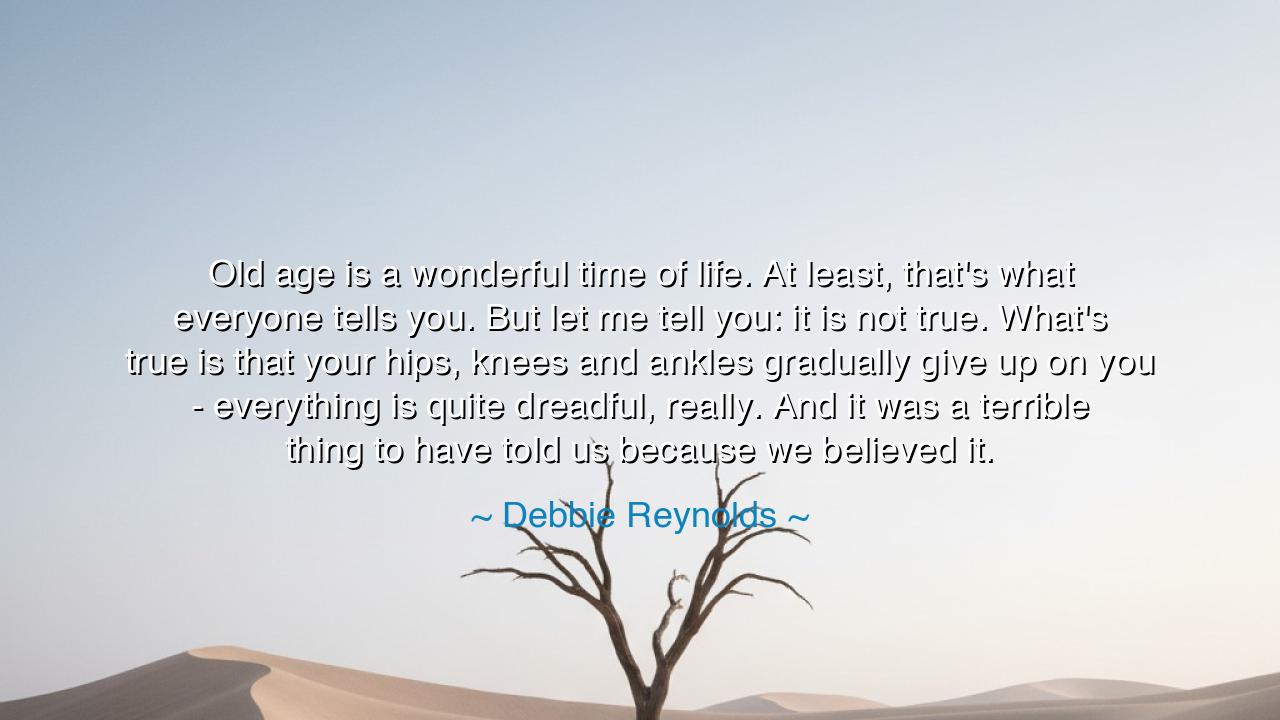
Old age is a wonderful time of life. At least, that's what
Old age is a wonderful time of life. At least, that's what everyone tells you. But let me tell you: it is not true. What's true is that your hips, knees and ankles gradually give up on you - everything is quite dreadful, really. And it was a terrible thing to have told us because we believed it.






"Old age is a wonderful time of life. At least, that's what everyone tells you. But let me tell you: it is not true. What's true is that your hips, knees and ankles gradually give up on you - everything is quite dreadful, really. And it was a terrible thing to have told us because we believed it." These candid words from Debbie Reynolds reveal a profound truth about the experience of aging—the gap between the idealized image of old age and the harsh reality that so often accompanies it. In the society of our time, we have been conditioned to think of old age as a time of peace, wisdom, and reflection, a time when one can rest and enjoy the fruits of a life well lived. But Reynolds, with her characteristic wit, reveals the truth that aging, while inevitable, can bring with it discomfort, limitations, and the slow unraveling of the body, a stark contrast to the idealized vision we have been sold.
The idealization of old age is not a modern invention. For centuries, ancient cultures viewed the elderly with reverence. In Ancient Greece, elders were seen as the bearers of wisdom and guidance, their age signifying their experience and knowledge. The Romans, too, celebrated the wisdom of age, believing that the elderly had a special role in guiding the younger generations. Yet, even in these societies, the fragility of the body was acknowledged. Cicero, the great Roman philosopher, often wrote about the struggles of aging, describing the physical decline that came with it, even as the mind might remain sharp. Reynolds' words reflect a universal, timeless struggle—the disconnect between youthful ideals and the reality of physical decline—a truth that spans across cultures and epochs.
In the ancient world, youth was often glorified, as it represented vigor, strength, and possibility. Yet, even then, the wisest of minds, such as Socrates, understood that the body would eventually betray the spirit, that old age would bring with it not only wisdom but also physical decay. Socrates himself, though revered for his intellect, was well aware of the limitations of the body, and often spoke about the necessity of the soul’s strength over the body's. The wisdom that came with age, he argued, was tempered by the weaknesses of the flesh, a truth that Reynolds poignantly captures in her description of her own physical deterioration. While Socrates found solace in the mind's resilience, Reynolds paints a more somber picture, where the body’s betrayal becomes an all-consuming reality.
Reynolds’ statement also speaks to a deeper psychological burden that comes with aging—the belief, nurtured by society, that growing old should be a time of peace and contentment. This belief, once deeply ingrained, can lead to disappointment and even despair when the physical realities of aging set in. In many ways, it is a form of betrayal—not by others, but by our own expectations. Foolish optimism, in this context, can be a heavy burden, as it creates an unrealistic standard by which we measure our own experiences and failures. By expecting old age to be idyllic, we are often left unprepared for the struggles it may bring.
The lesson here is a sobering one: aging must be met with realism. While we may long for the peace and wisdom associated with old age, we must also acknowledge and accept the limitations it brings. The body will grow weaker, and the mind may not always function as it once did. But this does not mean that old age lacks value or meaning. Rather, it invites us to reframe our understanding of what it means to live fully. The challenge of aging is not just to endure, but to find meaning in each moment despite the inevitable decline. Reynolds' words remind us that the truth of aging lies not in the idealized image we hold of it, but in the ways we adapt and find purpose even as we face its challenges.
In practical terms, this means that we must shift our mindset to embrace the reality of aging with both acceptance and grace. We must learn to value the wisdom that comes with age, while also acknowledging the physical toll it takes. To do so, we must care for our bodies as best we can, but also cherish the deeper, quieter aspects of life that can only be experienced in old age—reflection, gratitude, and a life lived fully, even within the confines of inevitable change. Reynolds does not suggest that aging is to be feared or resented, but that we must prepare for it with honesty, and in doing so, we find new ways to thrive.
In conclusion, Debbie Reynolds’ words serve as a powerful reminder that aging is not an ideal to be aspired to, but a process to be lived with awareness. Old age is neither a time of perfection nor an idyllic retreat, but a stage in the human experience that brings both joy and sorrow. Just as the ancient philosophers embraced both the wisdom and the weakness that came with age, so too must we find balance in our own journeys. Let us accept the inevitability of decline with dignity, find meaning in each stage of life, and never let the truth of aging rob us of the beauty and value that every moment, regardless of age, brings.






AAdministratorAdministrator
Welcome, honored guests. Please leave a comment, we will respond soon